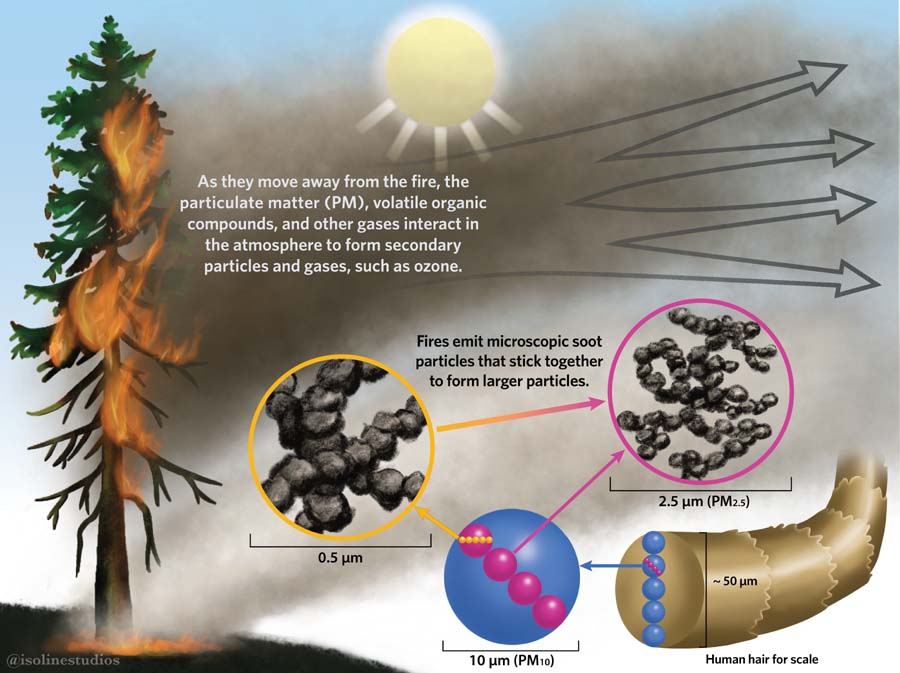
Tuesday July 6, 2021 | VICTORIA, BC
by Mary P Brooke, Editor | Island Social Trends
You’re probably already trying to find fans in your local stores or even online…quite the rush and back orders on those. And now there will be a rush on HEPA filters for managing smoky air in homes and workplaces.
Island Health has already been advising about managing the heat in your home. Keep windows open for a breeze, stay hydrated and stay cool.
But that will be harder to do once the smoky skies arrive in BC, as is expected to be the case in summer each year going forward. The bigger cause is climate change, which is producing extremes of heat that lend to greater likelihood of fires because ground conditions and forest brush are drier sooner and for longer periods of time.
On top of all that, in some households there will still be cases of COVID, where air should not be shared with others in a confined space.
Cleaner indoor air:
According to the BC Centre for Disease Control (BC CDC), while the timing of wildfire smoke events is mostly unpredictable, there are measures you can take to prepare before the season begins:
- Be aware of people in your household who may be more sensitive and susceptible to wildfire smoke including those with chronic conditions like asthma, COPD, heart disease, or diabetes, pregnant people, infants and children, and older adults.
- For those who require rescue medications, especially for respiratory conditions like asthma, stock up to ensure you have supplies on hand for when the smoke arrives.
- Consider purchasing a portable air cleaner with a HEPA air filter to reduce particulate matter indoors.
- During smoky times, keep your indoor air cleaner by closing your windows, recirculating air through a forced air system, and using an air cleaner. However, it’s important to not allow yourself to get too hot. For most people, overheating is more dangerous than breathing smoke.
- Use a well-fitted respirator or three-layer cloth or disposable mask outdoors. A good fit around the mouth and nose is the most important thing; inhaled air must pass through the material of the mask, not around it. Learn more about masks and wildfire smoke.
- People working outdoors should consult their occupational health and safety team about wildfire smoke protection.
- Learn about different tools you can use to monitor current air quality and wildfire smoke forecasts.
Learning about wildfires & exposure to smoke:
An increase in wildfire activity typically results in smoky skies and reduced air quality, says Emergency Management BC (EMBC).
EMBC says that a Smoky Skies Bulletin is a special public advisory to highlight the regional impacts of wildfire smoke. You can also check the Air Quality Health Index to help you understand what the air quality around you means for your health.
Health risk:
“In 2017, 2018, and 2020, we experienced consecutive days and weeks of the worst air quality that most people will ever experience in British Columbia. We know that smoke really affects how people feel when it’s happening,” said Henderson. “There is growing evidence that exposure to seasonal wildfire smoke may have longer-lasting impacts on our health,” says Sarah Henderson, scientific director of Environmental Health Services at the BC CDC.
Fine particulate matter (PM2.5) carries the greatest risk to human health as it can be inhaled deep into the lungs and cause inflammation and irritation. Some of the other components of smoke can also irritate the eyes, nose, throat, and lungs.
Wildfire smoke can be especially harmful for infants and young children, older people and people with pre-existing heart and lung conditions. The best way to protect yourself is to reduce your exposure.
Protecting yourself from smoke:
Here are a few tips to help you breathe easier:
- Stay indoors and keep the air clean (windows/doors closed, no smoking, no burning fireplaces/candles/incense, no vacuuming).
- When in a vehicle, keep windows closed with air conditioning set to recirculate.
- Reduce time spent outdoors and avoid vigorous outdoor activities.
- Visit places with controlled air supply, such as shopping malls, swimming pools, public libraries, etc.
- People with asthma or other chronic illness should ensure they have an adequate supply of inhalers/medication and should activate their asthma or personal protection plans.
- High-quality, portable air cleaners that use HEPA filtration can effectively remove smoke particles from the indoor air. People with respiratory conditions should consider purchasing HEPA filtration units.
- For non-emergency medical advice or assistance, visit HealthLinkBC or call 8-1-1.
- Only call 9-1-1 during an emergency, such as if someone is having difficulties breathing or is in cardiovascular distress.
Sheltering in place:
The smoke is bad! Should I self-evacuate to another community? Emergency Management BC answers that:
Sheltering-in-place (staying where you are) is usually the best way to reduce your exposure to wildfire smoke, but only if you have access to clean indoor air in your home or community. Because smoky conditions shift and move, self-evacuating to another community may not help you reduce your exposure. In fact, unnecessary relocation or travel can trigger stress and anxiety that may cause other negative health effects.
===== LINKS (articles by Island Social Trends):
Summer health hazards: heat wave & wildfire smoke (commentary | July 3, 2021)
Heat wave deaths at least 103 in BC, and counting (June 29, 2021)
Island Health advises about dangers of heat stroke (June 25, 2021)
===== LINKS (health agencies):
Protecting Your Health During Wildfire Season (Emergency Info BC)
Prepare for the worst: It’s time to get ready for wildfire smoke (BC Centre for Disease Control) | This link will be unavailable on Sunday July 11, 2021 (from 10 pm toward 1 am on July 12), for scheduled maintenance.





